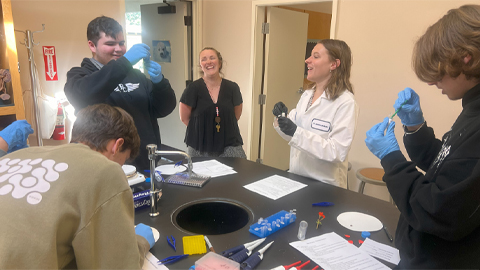A primer to starting grad school
Summer is here — which means many recent graduates are about to embark on a new journey in grad school. No matter what program you’re starting, the first couple weeks (and maybe months) of grad school may be a challenging transition. There can be a lot to navigate between classes starting, thinking about program requirements and possibly moving to a new city. Although everyone will have a different experience, I wanted to offer a few tips for making your first month or so go well.
Figure out the basics

First, I recommend familiarizing yourself with campus and key resources. For me, this meant walking around the campus to locate the buildings where my classes would be, my program’s offices, the library … you get the idea. I would call myself directionally challenged, so knowing exactly where I had to go before our first 9 a.m. class helped ease my mind.
I also made sure to stop by my program coordinator’s office (I’ve written before about the benefits of getting to know your program coordinator). I introduced myself again (even if you meet your coordinator at orientation, it can be a blur) and asked questions about what to expect for the upcoming semester.
I also made sure I had access to all the resources I needed for classes — my campus email, online course tools, etc. If you’re commuting to campus, make sure you know where to park. If you need accommodations, it’s a good idea to check in with the office of accommodations or the accessibility office to make sure you’re all set (and stay tuned for an upcoming article about how to seek accommodations in grad school).
The start of classes
Class structures vary by program. At my school, students across all the life sciences graduate programs started with the same semester-long core course that served as the basis of our future coursework. This intensive class was our only course during that first semester outside of departmental seminars.
I needed to get into the groove of attending classes and staying on top of the material to set the right tone for the rest of the semester. This can be challenging if you’ve been out of school and are out of the habit of studying, or if you’re used to the pace of undergrad courses. Use the first month or so to figure out what balance of studying works for you. It’s easier to stay on top of the coursework and reading instead of catching up after falling behind, so I recommend starting off with strong study habits while the material and course work are lighter.
Think about organization
While it may seem trivial early on in grad school, think about how you are going to keep your materials organized. Keeping coursework in folders or using tools such as OneNote can make studying easier.
Try out reference programs or software, find one you like and start to build your publication database. This will make it easier down the line when you are actually working on research papers.
Also, if you really want to stay on top of things, consider how you will organize your emails. By the end of grad school, I had over 10,000 emails in my inbox, and I really wished I’d been better about sorting them into folders or deleting unnecessary emails. A periodic digital declutter can help you stay organized throughout your studies.
Make and keep connections
Lastly, I recommend getting to know your fellow grad students. Study buddies help you stay accountable to a schedule, and study group resource sharing could be a valuable way to ensure you understand the course work. Even if you like to study solo, having pals to provide much-needed study breaks can be valuable. Plus, a support system of others who are going through grad school can be helpful when the going gets tough.
Remember to maintain your important connections outside grad school as well. It’s easy to get academic tunnel vision, especially when course work is intense, but balancing your school work with your non–grad-school life will help you maintain balance in the long run.
Enjoy reading ASBMB Today?
Become a member to receive the print edition four times a year and the digital edition monthly.
Learn moreFeatured jobs
from the ASBMB career center
Get the latest from ASBMB Today
Enter your email address, and we’ll send you a weekly email with recent articles, interviews and more.
Latest in Education
Education highlights or most popular articles

Using DNA barcodes to capture local biodiversity
Undergraduate at the University of California, Santa Barbara, leads citizen science initiative to engage the public in DNA barcoding to catalog local biodiversity, fostering community involvement in science.

Embrace your neurodivergence and flourish in college
This guide offers practical advice on setting yourself up for success — learn how to leverage campus resources, work with professors and embrace your strengths.

Survival tools for a neurodivergent brain in academia
Working in academia is hard, and being neurodivergent makes it harder. Here are a few tools that may help, from a Ph.D. student with ADHD.

Quieting the static: Building inclusive STEM classrooms
Christin Monroe, an assistant professor of chemistry at Landmark College, offers practical tips to help educators make their classrooms more accessible to neurodivergent scientists.

Hidden strengths of an autistic scientist
Navigating the world of scientific research as an autistic scientist comes with unique challenges —microaggressions, communication hurdles and the constant pressure to conform to social norms, postbaccalaureate student Taylor Stolberg writes.

Women’s History Month: Educating and inspiring generations
Through early classroom experiences, undergraduate education and advanced research training, women leaders are shaping a more inclusive and supportive scientific community.

